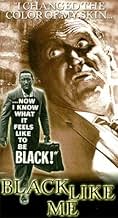अपनी भाषा में प्लॉट जोड़ेंBased on the true story of a white reporter who, at the height of the civil-rights movement, temporarily darkened his skin to experience the realities of a Black man's life in the segregated... सभी पढ़ेंBased on the true story of a white reporter who, at the height of the civil-rights movement, temporarily darkened his skin to experience the realities of a Black man's life in the segregated South.Based on the true story of a white reporter who, at the height of the civil-rights movement, temporarily darkened his skin to experience the realities of a Black man's life in the segregated South.
- पुरस्कार
- कुल 1 जीत
Lenka Peterson
- Lucy Horton
- (as Lenka Petersen)
P. Jay Sidney
- Frank Newcomb
- (as P.J. Sidney)
फ़ीचर्ड समीक्षाएं
This movie mostly follows the book closely, but Whitmore's performance gives it an altogether different tone. Instead of portraying Griffin's experience realistically, he's just angry throughout the film. As Griffin himself noted, that kind of behavior would never have been tolerated by the Southerners. Yet Whitmore blusters along, talking back and actually threatening at times. I found that this really detracted from the message of the book, and the film fails to convey the despondence that overcame Griffin after the full realization of his experiment. Whitmore also makes Griffin look naive, uneducated, and speaks in a grating northern accent. In conclusion, the film is okay, and relatively true to the book, if you ignore Whitmore's out-of-place angry delivery.
Griffin's book, which I highly recommend reading, is not well reflected in this movie. The book is an important one- the movie failed to portray the events deeply and meaningfully. While the book draws one into the experience and emotion of one living as an Arfican-American in the South during this time, the film leaves one feeling little more than a disconnected witness of a poor narration.
Poorly directed, poorly cast, abysmally lit and acted, often to the extent that Griffin's message is lost in the morass. At times the director has taken such creative license as to change Griffin's character, adding nothing, distracting from the premise and in so doing disconnects the viewer from the protagonists world.This movie screams to be remade as the important bridge in cultural understanding that the book remains.
Poorly directed, poorly cast, abysmally lit and acted, often to the extent that Griffin's message is lost in the morass. At times the director has taken such creative license as to change Griffin's character, adding nothing, distracting from the premise and in so doing disconnects the viewer from the protagonists world.This movie screams to be remade as the important bridge in cultural understanding that the book remains.
John Howard Griffin was a white reporter who darken his skin to experience life as a black man in the deep South. This is based on his book. John Finley Horton (James Whitmore) from Texas wants to write a series of articles on integration for Eli Carr (Clifton James) but he's afraid of the repercussions. He gets treatments of pills and tanning lamps to darken his skin. Along the way, he reveals the truth to shoeshine Burt Wilson (Richard Ward) and gets his help to pass.
"I changed the color of my skin... now I know what it feels like to be BLACK!" They couldn't get away with that tagline today. No matter how well the disguise, the color doesn't come off of a black man at the end of the day. Its heart is in the right place, but James Whitmore looks like a darkened white man. The eyes are one problem and he needs a good pair of sunglasses. The other problem is that it isn't always a compelling movie. There are scenes of eye opening racism. There are also weird little scenes about race relations. It's put together like a series of disconnected vignettes. As a movie, it doesn't really flow and the acting sometimes fall into melodrama territories. It's still interesting to watch.
"I changed the color of my skin... now I know what it feels like to be BLACK!" They couldn't get away with that tagline today. No matter how well the disguise, the color doesn't come off of a black man at the end of the day. Its heart is in the right place, but James Whitmore looks like a darkened white man. The eyes are one problem and he needs a good pair of sunglasses. The other problem is that it isn't always a compelling movie. There are scenes of eye opening racism. There are also weird little scenes about race relations. It's put together like a series of disconnected vignettes. As a movie, it doesn't really flow and the acting sometimes fall into melodrama territories. It's still interesting to watch.
This is the sleepy South as it really was. The pace is deliberate but necessarily so. The direction and acting is gritty and real.
The anger was real. The prejudice was real. The hate was real. The fear was real. The pain was real. It really happened this way.
This movie shows us all that. We walk in the shoes of a white man who looks like a black man...but we will never know. We can only imagine like James Whitmore's character, John Horton. We can only imagine what a man or woman had to endure in the unilluminated history of the United States.
Seeing this, we know, though we have come quite some distance, that we have still a long way to go before the reality is but a memory.
I salute all of those involved in this film and Mr. John Howard Griffin who endured it all and let us know the cruelty of man and helped us open our eyes.
The anger was real. The prejudice was real. The hate was real. The fear was real. The pain was real. It really happened this way.
This movie shows us all that. We walk in the shoes of a white man who looks like a black man...but we will never know. We can only imagine like James Whitmore's character, John Horton. We can only imagine what a man or woman had to endure in the unilluminated history of the United States.
Seeing this, we know, though we have come quite some distance, that we have still a long way to go before the reality is but a memory.
I salute all of those involved in this film and Mr. John Howard Griffin who endured it all and let us know the cruelty of man and helped us open our eyes.
Unfortunately, the quality of this movie was hindered by the poor production values of the period, as well as a low budget. This is the true story of John Howard Griffin (in the movie referred to as John Finley Horton, a Caucasian man who cared enough about the issues of racism that he put himself and his family in danger by posing as an African American man who traveled through the then racist Deep South of the United States in the late 1950's. The movie does not entirely succeed in capturing the terror, the weariness, the lack of dignity, and the outright hatred experienced by the lead character simply because of the color of his skin. However, seeing this movie should stimulate one's curiosity enough to read the book, one of the best and most disturbing I have ever read and whose message is still relevant today And for those of you poor souls who believe that this movie is little more than an example of "reverse racism," I suggest you consult a dictionary because there is no such term.
क्या आपको पता है
- ट्रिवियाGriffin actually went through the pigment darkening process twice. The first time was for his original article in Sepia Magazine. The second time was much later for the book, when he returned to some of the same locales to be photographed in character.
- गूफ़When Horton, after meeting the PhD student, opens his wallet to pay in the diner, something falls out of it near the counter. No one notices or refers to it.
- कनेक्शनFeatured in Classified X (2007)
टॉप पसंद
रेटिंग देने के लिए साइन-इन करें और वैयक्तिकृत सुझावों के लिए वॉचलिस्ट करें
- How long is Black Like Me?Alexa द्वारा संचालित
विवरण
बॉक्स ऑफ़िस
- बजट
- $2,73,000(अनुमानित)
- चलने की अवधि1 घंटा 45 मिनट
- रंग
- ध्वनि मिश्रण
इस पेज में योगदान दें
किसी बदलाव का सुझाव दें या अनुपलब्ध कॉन्टेंट जोड़ें






















